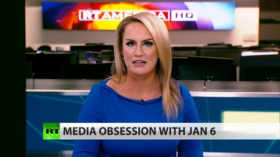Fauci boss prompts ‘deep fake’ speculation with bizarre Covid stunt

Outgoing US National Institutes of Health (NIH) Director Dr. Francis Collins raised eyebrows after performing a Covid-19-themed cover of ‘Somewhere Over the Rainbow’ at a farewell event this week.
After the US Department of Health and Human Services (HHS) thanked Collins for his service in a town hall on Tuesday, the NIH director pulled out a guitar and microphone and announced he would be performing a “grand finale” for Americans who “have been going through this pandemic and trying to imagine how it’s going to feel when we’re finally past that.”
Collins – who has served as director and as Dr. Anthony Fauci’s boss since 2009 – then broke out into song, singing, “Somewhere past the pandemic, when we’re free. There’s a life I remember, full of activity.”
“Somewhere past the pandemic, masks will come off. No more need for a nose swab every time we cough,” he continued.
Director of the NIH, Dr. Francis Collins... pic.twitter.com/tUKqkK84td
— Libs of Tik Tok (@libsoftiktok) December 14, 2021
Some social media users questioned whether the performance was an AI-generated deep fake video, alerting fact-checkers, which, however, affirmed that the stunt did in fact take place.
It wasn’t the first time that Collins was caught belting out a coronavirus-themed song, having previously recorded himself singing a parody of ‘Puff the Magic Dragon’ titled ‘Poof, coronavirus’.
REPORT: This is Dr. Fauci's boss, Francis Collins. Director of the NIH. - Sings song about Coronavirus to the tune of 'Puff the Magic Dragon'. pic.twitter.com/et7BBbdUl3
— New Granada (@NewGranada1979) December 7, 2021
Collins announced in October that he would be stepping down from his role by the end of the year, after serving three US presidents over 12 years – the longest reign of any presidentially-appointed NIH director.
In a statement at the time, Collins said it had been “an incredible privilege to lead this great agency for more than a decade,” adding that the decision “to step down was a difficult one.”
“I fundamentally believe, however, that no single person should serve in the position too long, and that it’s time to bring in a new scientist to lead the NIH into the future.”













